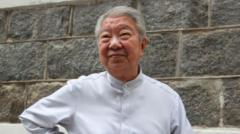The League of Social Democrats, one of Hong Kong's final pro-democracy parties, announced its disbandment due to mounting pressures and the politicization of the city, highlighting the ongoing erosion of political freedoms under the national security law.
Hong Kong's Last Major Pro-Democracy Party Ceases Operations Amid Intense Pressure

Hong Kong's Last Major Pro-Democracy Party Ceases Operations Amid Intense Pressure
The League of Social Democrats disbands, marking a significant moment for dissent in the territory as political pressures mount.
The League of Social Democrats, once a prominent voice for pro-democracy in Hong Kong, officially disbanded on Sunday, revealing the challenges faced by political dissent in the territory. Current and former members gathered to announce their decision, which came after nearly 20 years of advocating for civil liberties. The party is recognized as one of the last few remaining protest organizations in the city.
During their disbandment announcement, party chair Chan Po Ying expressed the severe constraints they faced, stating, "The red lines are now everywhere." Chan indicated that the party's decision to cease operations was reached after careful consideration, driven by escalating pressure and the fundamental politicization of societal norms in Hong Kong.
This closure marks the third significant opposition disbandment within 2023, following a long history of street protests and active resistance. The timing of their announcement is notable, as it closely coincides with the fifth anniversary of the Beijing-imposed national security law, which, critics argue, has systematically targeted and dismantled political opposition.
In their statement, party members reflected on the hardships endured over the years, from internal conflicts to the near-complete imprisonment of their leadership. The national security law was introduced in response to violent protests in 2019, but opponents contend that its real purpose has been to quash dissent.
Vice-chairman Dickson Chau voiced the sentiment that it has become perilous to operate a political party in Hong Kong. Despite the bleak outlook, he underscored the importance of political organization, warning of a future where collective action and voices could be forgotten amidst oppression.
Chau's comments emphasized a growing unease that extends beyond active politicians, as ordinary citizens also grapple with the threat of police scrutiny and suppressive measures. Amidst the increasing severity of political persecution, where party accounts have been closed and opposition members jailed, the landscape for civic engagement in Hong Kong remains grim.
The disbanding of the League of Social Democrats symbolizes a significant loss not only for the party but also for the broader movement towards democracy and freedom in Hong Kong, as the repercussions of the national security law continue to reshape the political landscape.



















